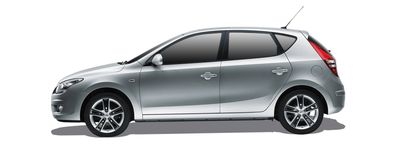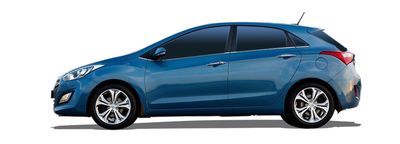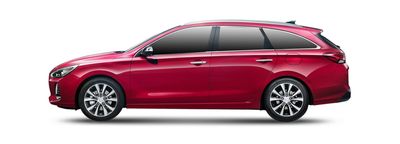Table of Contents
Hyundai i30 engines
The Hyundai i30 has become one of the most successful compact cars since its launch in 2007, offering a diverse range of engines across three generations. Each generation has brought new technologies and different strengths and weaknesses, from the tried and tested naturally aspirated engines to modern turbo and hybrid powertrains.

Hyundai i30 Generation I (2007-2012)

The first Hyundai i30 generation was Hyundai's entry into the European compact class and was characterized by robust but technically conservative engines. With proper maintenance, the mileage easily reached 250,000 to 350,000 kilometers, with the diesel engines often even managing 400,000 kilometers without major repairs. Major engine damage was rare, only the early 1.6 CVVT petrol engines tended to have problems with the timing chain between 150,000 and 200,000 kilometers. The absolute top engine of this generation was the 1.6 CRDi with 128 hp, which optimally combined power, reliability and economy and was considered one of the best diesel engines in its class.
Hyundai i30 petrol engines: Generation I (2007-2012)
The Hyundai i30 petrol engine range mainly comprised naturally aspirated engines with CVVT technology. The 1.4 MPI with 80 kW (109 PS) was available as the entry-level engine and proved to be particularly economical and reliable. The 1.6 CVVT with 90 kW (122 hp) formed the heart of the range and offered a balanced combination of performance and fuel consumption. These Hyundai i30 engines rarely suffered from major problems - occasionally timing chain problems occurred when maintenance was neglected, but overall they were considered very reliable. The most powerful Hyundai i30 petrol engine was a 2.0 CVVT with 105 kW (143 hp), but it was offered less frequently and had higher fuel consumption.
Hyundai i30 diesel engines: Generation I (2007-2012)
The Hyundai i30 diesels were dominated by the 1.6 CRDi with various output levels from 66 kW (90 PS) to 94 kW (128 PS). The Hyundai i30 1.6 CRDi with 85 kW (116 PS) developed into the most reliable engine of the entire generation - especially the variants produced from 2009 onwards with common-rail injection and particulate filter as standard proved to be very durable and economical. These Hyundai i30 CRDi engines already met the Euro 5 standard and offered an excellent combination of performance, consumption and reliability. There was also a 2.0 CRDi with 103 kW (140 hp), but this was less common.
| Hyundai i30 engine | Power output | Fuel consumption | Typical weaknesses | Rating |
|---|---|---|---|---|
| 1.4 MPI | 109 HP | 6.8-7.2 l/100km | Very robust, little power | Good |
| 1.6 CVVT | 122 HP | 7.1-7.8 l/100km | Occasional timing chain | Very good |
| 2.0 CVVT | 143 HP | 8.2-8.9 l/100km | Higher consumption | Good |
| 1.6 CRDi | 90-128 HP | 4.8-5.4 l/100km | Very robust and economical | Very good |
| 2.0 CRDi | 140 HP | 5.2-5.8 l/100km | Not very common | Good |

Hyundai i30 Generation II (2012-2017)

The second Hyundai i30 generation marked a significant technological leap with the introduction of turbocharged petrol engines and more modern diesel units. With proper maintenance, most engines of this generation can easily reach 300,000 to 400,000 kilometers, with the 1.6 CRDi diesels continuing to be considered particularly durable. Major engine failures were rare, with only the new 1.0 T-GDI turbocharged petrol engines occasionally showing problems with direct injection. The absolute highlight was the 1.6 CRDi with 136 hp - a further development of the proven diesel engine with even better efficiency. For the first time, there was also a sporty i30 N with a 250 hp turbo petrol engine from 2017.
Hyundai i30 petrol engines: Generation II (2012-2017)
The Hyundai i30 petrol engine range was expanded to include modern turbo engines. The tried-and-tested 1.6 CVVT remained in the range with 97 kW (132 PS), but was supplemented by the new 1.0 T-GDI with 88 kW (120 PS). This small Hyundai i30 turbo petrol engine proved to be economical, but susceptible to coking of the direct injection system. The 1.4 T-GDI with 103 kW (140 PS) offered a good balance between performance and consumption. For sporty drivers, the Hyundai i30 N was available from 2017 with a 2.0 T-GDI and 184 kW (250 PS), which proved to be a reliable high-performance engine, but had significantly higher fuel consumption.
Hyundai i30 diesel engines: Generation II (2012-2017)
The Hyundai i30 1.6 CRDi was offered in various power levels from 81 kW (110 PS) to 100 kW (136 PS). All Hyundai i30 diesels had modern common-rail injection with SCR catalytic converter and particulate filter. The Hyundai i30 1.6 CRDi with 100 kW (136 hp) proved to be the most reliable and efficient engine of this generation, with a test consumption of just 4.2-4.8 liters per 100 km and high reliability - ideal for frequent drivers. In addition, there was a 1.4 CRDi with 66 kW (90 hp) as an entry-level diesel, but this was less common.
| Hyundai i30 engine | Power output | Fuel consumption | Typical weaknesses | Rating |
|---|---|---|---|---|
| 1.0 T-GDI | 120 HP | 5.8-6.4 l/100km | Direct injection Coking | Average |
| 1.4 T-GDI | 140 HP | 6.2-6.8 l/100km | Robust, good balance | Good |
| 1.6 CVVT | 132 HP | 6.9-7.5 l/100km | Proven and reliable | Very good |
| 2.0 T-GDI N | 250 HP | 8.4-9.2 l/100km | High fuel consumption | Good |
| 1.4 CRDi | 90 HP | 4.5-5.0 l/100km | Not very common | Good |
| 1.6 CRDi | 110-136 HP | 4.2-4.8 l/100km | Very robust and economical | Very good |

Hyundai i30 Generation III (2017-today)

The current Hyundai i30 generation represents the technological pinnacle of the range with modern turbo engines, mild hybrid technology and powerful N-Performance variants. All engines of this generation are designed for longevity and can easily reach 350,000 to 450,000 kilometers with proper maintenance. The mild hybrid technology promises an even longer service life, as the electric assistance relieves the combustion engine. The top-of-the-range engine is the 1.5 T-GDI with 160 PS, which combines sporty performance with high efficiency. The N-Performance variants with up to 280 hp set new standards in the compact class.
Hyundai i30 petrol engines: Generation III (2017-today)
Modern turbo petrol engines form the basis of the Hyundai i30 engine range. The 1.0 T-GDI with 88 kW (120 PS) has been retained and supplemented by a mild hybrid variant with 48-volt technology. The new 1.5 T-GDI with 118 kW (160 PS) is considered to be particularly successful and is developing into the best engine of this generation - it offers smooth power delivery over a wide rev range and has so far been free of major series production problems. For sporty drivers, the Hyundai i30 N with 2.0 T-GDI is available in various power levels from 184 kW (250 hp) to 206 kW (280 hp), with the most powerful variant being used in the i30 N Performance.
Hyundai i30 diesel engines: Generation III (2017-today)
The tried-and-tested Hyundai i30 1.6 CRDi has been further developed and is available with outputs from 85 kW (115 PS) to 100 kW (136 PS). All variants feature modern SCR technology and meet the Euro 6d standard. The Hyundai i30 1.6 CRDi with 100 kW (136 PS) continues the tradition of reliable Hyundai diesels and continues to offer one of the lowest fuel consumption figures in its class at 4.1-4.6 liters per 100 km.
Hyundai i30 mild hybrid engines: Generation III (2017-present)
From 2020, the Hyundai i30 was equipped with 48-volt mild hybrid technology. The 1.0 T-GDI MHEV with 88 kW (120 PS) and the 1.5 T-GDI MHEV with 118 kW (160 PS) offer reduced fuel consumption and smoother power delivery thanks to electric assistance. These Hyundai i30 mild hybrid engines are considered the most efficient petrol engines in the range.
| Hyundai i30 engine | Power output | Fuel consumption | Typical weaknesses | Rating |
|---|---|---|---|---|
| 1.0 T-GDI | 120 HP | 5.4-6.0 l/100km | Occasional direct injection | Good |
| 1.0 T-GDI MHEV | 120 HP | 5.0-5.6 l/100km | No serial problems so far | Very good |
| 1.5 T-GDI | 160 HP | 5.8-6.4 l/100km | Very robust and efficient | Very good |
| 1.5 T-GDI MHEV | 160 HP | 5.4-6.0 l/100km | Excellent efficiency | Very good |
| 2.0 T-GDI N | 250-280 HP | 8.0-8.8 l/100km | High consumption, but robust | Good |
| 1.6 CRDi | 115-136 HP | 4.1-4.6 l/100km | Proven and very economical | Very good |

Conclusion: The best Hyundai i30 engines of all generations
The development of the Hyundai i30 engines shows a continuous improvement in terms of reliability, efficiency and performance. While the first generations impressed with their robustness, the modern turbo and mild hybrid engines also offer high efficiency and sporty driving performance. The diesel engines have remained the most reliable and economical powertrains in the range across all generations.
- Best Hyundai i30 gasoline engine:
The Hyundai i30 1.5 T-GDI MHEV (160 PS, Generation III) combines modern mild-hybrid technology with high efficiency and excellent reliability.
- Best Hyundai i30 diesel engine:
The Hyundai i30 1.6 CRDi (136 PS, Generation II & III) offers the best combination of reliability, economy and everyday usability across all generations.
- Best Hyundai i30 performance engine:
The Hyundai i30 N 2.0 T-GDI (280 PS, Generation III) with its high performance and surprisingly good reliability for a high performance engine.
For maintenance and spare parts for all Hyundai i30 generations, AUTODOC offers a comprehensive range of original and quality spare parts with fast delivery.















